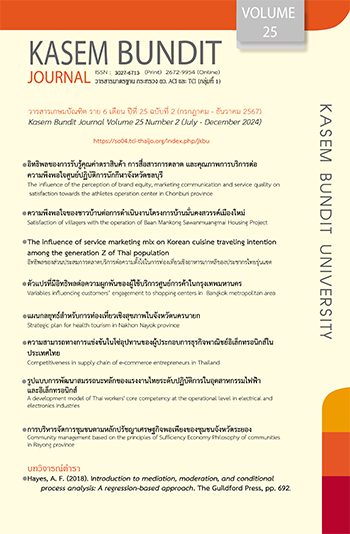The influence of service marketing mix on Korean cuisine traveling intention among the generation Z of Thai population
Keywords:
Service marketing mix, Cuisine traveling intention, Generation Z Thai populationAbstract
PURPOSES: To investigate the level of Korean cuisine traveling intention, compare Korean cuisine traveling intention with social-economic background, and study the influence of service marketing mix on Korean cuisine traveling intention among generation Z of Thai population. METHODS: It was a sample survey research. The questionnaires were collected from 709 respondents who were generation Z of Thai population which were selected by multistage sampling technique. RESULTS: It was found that generation Z of Thai population had a high level of Korean cuisine traveling intention. Generation Z of Thai population who had different genders were different in Korean cuisine traveling intention significantly (p<0.05). The service marketing mix influenced Korean cuisine traveling intention among generation Z of Thai population significantly (p<0.01). THEORETICAL/POLICY IMPLICATIONS: Travel agencies or people involved in the tourism business could use the research results as guidelines for appropriately organizing Korean cuisine traveling for generation Z of Thai population.
References
Buchner, A. (2010). G*Power: Users guide-analysis by design. Heinrich-Heine-Universität.
Chakrapani, C. (2011). Statistical reasoning vs. magical thinking: Shamanism as statistical knowledge: Is a sample size of 30 all you need?
http://www.chuckchakrapani.com/articles/pdf/0411chakrapani.pdf
Chatterjee, S., & Suklabaıdya, P. (2020). Food image and travel intention: From New Delhi to New York. Journal of Gastronomy Hospitality and Travel, 3(1), 3-19.
Cronbach, L. J. (1990). Essential of psychological testing. Harper & Row.
Galati, A., Testa, R., Schifani, G., & Migliore, G. (2023). Tourists’ motivation toward culinary destination choice: Targeting Italian tourists. Journal of Food Service Business Research, 26(4), 647-668.
Kılıç, B., Bekar, A., & Yozukmaz, N. (2021). The new foodie generation: Gen Z. In Generation Z Marketing and Management in Tourism and Hospitality: The Future of the Industry (pp. 223-247). Springer International Publishing.
Kim, J. H., Kim, K. J., Park, B. T., & Choi, H. J. (2022). The phenomenon and development of K-Pop: The relationship between success factors of K-Pop and the national image, social network service citizenship behavior, and tourist behavioral intention. Sustainability, 14(6), 3200.
Kim, S., Kim, M., Agrusa, J., & Lee, A. (2012). Does a food-themed TV drama affect perceptions of national image and intention to visit a country? An empirical study of Korea TV drama. Journal of Travel & Tourism Marketing, 29(4), 313-326.
Korean Food Promotion Institute. (2024). Introduction to the institution. https://www.hansik.or.kr/contents/contentsDetail.do?cntntsSeq=58&menuSn=217
Martin, C. A., Izquierdo, C. C., & Laguna-Garcia, M. (2021). Culinary tourism experiences: The effect of iconic food on tourist intentions. Tourism Management Perspectives, 40, 100911.
National Statistical Office of Thailand. (2023). Population and housing census. http://statbbi.nso.go.th/staticreport/page/sector/th/01.aspx
Othman, B., Harun, A., Sadq, Z. M., Rashid, W. N., Abdullah, K. M., Mohammed, H. O., & Faeq, D. K. (2020). Effects of service marketing on umrah customer satisfaction: Empirical study on umrah traveling industry in Malaysia. TEST Engineering and Management, 83, 22895-22909.
Promsivapallop, P., & Kannaovakun, P. (2019). Destination food image dimensions and their effects on food preference and consumption. Journal of Destination Marketing & Management, 11, 89-100.
Pu, B., Du, C., & Phau, I. (2024). Effects of food experience on travel intention to the country of origin of food cuisine: A cross-national study. Journal of Hospitality and Tourism Management, 58, 476-494.
Rahman, M., Islam, M. S., Al Amin, M., Sultana, R., & Talukder, M. I. (2019). Effective factors of service marketing mix on tourist satisfaction: A case study. Asian Social Science, 15(7), 1-15.
Reisinger, Y., & Crotts, J. C. (2009). The influence of gender on travel risk perceptions, safety, and travel intentions. Tourism Analysis, 14(6), 793-807.
Rousta, A., & Jamshidi, D. (2020). Food tourism value: Investigating the factors that influence tourists to revisit. Journal of Vacation Marketing, 26(1), 73-95.
World Food Travel Association. (2024). State of the food & beverage tourism (SOTI) industry. https://www.worldfoodtravel.org/annual-industry-report
World Tourism Organization. (2012). Global report on food tourism.
https://webunwto.s3.eu-west-1.amazonaws.com/s3fs-public/2019-09/food_tourism_ok.pdf
World Tourism Organization. (2017). Second global report on gastronomy tourism. https://www.e-unwto.org/doi/abs/10.18111/9789284418701.
Downloads
Published
How to Cite
Issue
Section
License
Copyright (c) 2024 KASEM BUNDIT JOURNAL

This work is licensed under a Creative Commons Attribution-NonCommercial-NoDerivatives 4.0 International License.
ทัศนคติ ความคิดเห็นใด ๆ ที่ปรากฏในวารสารเกษมบัณฑิตฉบับนี้เป็นของผู้เขียน โดยเฉพาะ มหาวิทยาลัยเกษมบัณฑิตและบรรณาธิการ ไม่จำเป็นต้องมีความเห็นพ้องด้วย







